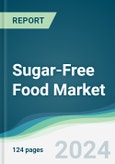The sugar-free food market is expected to grow at a CAGR of 7.31%, reaching a market size of US$89.028 billion in 2029 from US$54.313 billion in 2022.
MARKET TRENDS:
The changing living conditions of people have severely affected their dietary patterns over the past few years. This is expected to elevate the demand for low-sugar and sugar-free food in the coming years. The health concerns associated with the intake of high sugar-containing food (like obesity and diabetes) are another primary reason which can drive the sugar-free food market in the years to come. The growing awareness and self-care among the people hold a great opportunity for the growth of the sugar-free food market. Also, the growing online shopping application is expected to power up the demand and sales of sugar-free food, especially with the high internet penetration due to the growing digital infrastructure.One of the major restraints for the market's growth is the ambiguity on the safety of artificial sweeteners used in sugar-free food, which may give rise to the low acceptance of these products in the coming years.
MARKET DRIVERS:
Growing health concerns are surging demand for sugar-free foods.
Most of the food manufactured by the companies contain high proportions of sugar, salt, saturated fat, and calories, and its high consumption is directly linked to harmful side effects and diseases like obesity, diabetes, impaired glucose tolerance, hypertension, dyslipidemia, and a high risk of heart diseases. Excess sugar consumption induces extra insulin present in the body to affect the arteries, which thus can lead to wall inflammation and increase the threat of heart diseases, heart attacks, and strokes. According to WHO, millions of people die from cardiovascular diseases every year, which has made CVDs a leading cause of death globally. This has become a major concern for governments across the globe. Therefore various companies and organizations have started endorsing sugar-free and healthy food, which is expected to fuel its market growth.Growing online distribution channels are anticipated to fuel the market growth.
The deep penetration of the internet, accompanied by the ever-increasing use of smartphones, is expected to provide a significant boost to the market in the coming years. Online Shopping provides ease to customers to select from a range of domestic and foreign varieties. Online distribution has increased significantly, especially after the pandemic. With the ever-increasing use of smartphones powered by the internet, the sugar-free food market is expected to grow further. With the advancement, companies have now developed food and beverage-specific websites and applications to aid the tedious process of selecting a specific category. This includes famous sites like Big Basket, Swiggy Instamart, etc.MARKET RESTRAINTS:
Ambiguity on the safety of artificial sweeteners.
Usually, sugar-free food products use artificial sweeteners in their products that act as a substitute for sugar in taste but usually have less food energy. Apart from its benefits, when tested on animals, studies, and researchers have found that artificial sweeteners cause brain tumors, bladder cancer, weight gain, brain, and many other health hazards. Also, according to the US National Institutes of Health, people have experienced side effects, including carcinogenicity, due to the high intake of artificial sweeteners. However, Cancer Research UK and the US National Cancer Institute have claimed that sweeteners do not cause any cancer, but the above-mentioned concerns still revolve around the people, which can hamper the market's growth in the future.North America is anticipated to be the major regional market.
The growing focus on health and well-being is driving a significant portion of the sugar-free food market's growth in North America. Alternatives to conventionally sugary items are in greater demand as customers become more health conscious. Growing knowledge of the health risks including those related to diabetes and obesity of excessive sugar intake is a major driving force behind this trend. Owing to these health concerns, people are actively looking for dietary choices that are devoid of sugar. The market is growing as a result of laws and programs put in place by the government to encourage better eating.Key Developments:
- In January 2023, the Pepsi brand introduced Pepsi Zero Sugar, proving that Zero has never tasted better. Customers may redeem up to 10 million FREE Pepsi Zero Sugars starting with the NFL Playoffs through the Super Bowl. A new sweetener system is used in the updated Pepsi Zero Sugar formula to produce a stronger and more refreshing flavor profile than the previous Pepsi Zero Sugar variety.
Segmentation:
By Product Type
- Sugar-free beverages
- Sugar-free dairy products
- Sugar-free confectionery
- Sugar-free bakery products
- Others
By Distribution Channel
- Online
- Offline
By Geography
- North America
- USA
- Canada
- Mexico
- South America
- Brazil
- Argentina
- Others
- Europe
- United Kingdom
- Germany
- France
- Spain
- Others
- Middle East and Africa
- Saudi Arabia
- UAE
- Israel
- Others
- Asia Pacific
- China
- Japan
- India
- South Korea
- Taiwan
- Thailand
- Indonesia
- Others
Table of Contents
Companies Mentioned
- Nestle S.A.
- PepsiCo. Inc.
- The Kellogg Company
- The Kraft Heinz Company
- The Coca-Cola Company
- Unilever Plc.
- The Hershey Company
- Mars Incorporated
- Mondelez International Inc.
- Strauss Group Ltd.
Table Information
| Report Attribute | Details |
|---|---|
| No. of Pages | 124 |
| Published | March 2024 |
| Forecast Period | 2022 - 2029 |
| Estimated Market Value ( USD | $ 54.31 Billion |
| Forecasted Market Value ( USD | $ 89.03 Billion |
| Compound Annual Growth Rate | 7.3% |
| Regions Covered | Global |
| No. of Companies Mentioned | 10 |









